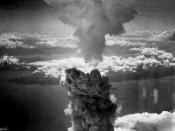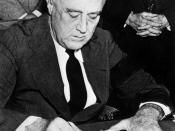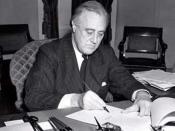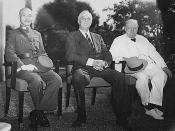World War II began in 1939 and, although the United States were not involved, there was concern that it soon would be. The impact on the world and also on individuals was vast. It took an amazing collaborative effort to strengthen the general relations, which didn't seem to materialise until the war was "ÃÂwell under way'.
During the months leading up to the war, the USA had hoped not to participate.
President Roosevelt made it clear that Britain could buy equipment, but that it would be on a strictly "ÃÂcash and carry' basis. He promised Americans that they would not have to fight, but he warned them that non-involvement would not necessarily insure peace. Soon after this talk America appeared to take a more helpful attitude towards Britain. In March 1941, a scheme was organised called "ÃÂLend-Lease', by which Britain could borrow or hire military equipment. By this means the USA hoped to ensure victory over the Axis without involving its own troops.
However, when some Americans objected to Lend-Lease, Roosevelt immediately came to the assistance of Britain, saying that it was just like lending your garden hose to a neighbour whose house was on fire.
In mid-1941, President Roosevelt imposed a ban on all trade with Japan, and froze all Japanese money in the USA. The aim was to force Japan to keep the peace. No sooner had the US authorities broken the Japanese diplomatic code, they realised it was an invitation for immediate attack. Obviously, Japan tried in vain to get the embargo lifted on terms that would still let them take the territory they wanted, but to no avail, they began to make preparations for war.
The Japanese army and navy had, in fact, devised a war plan in which they had great confidence. They proposed to "ÃÂknock out' the US Pacific Fleet, a move that would gain them a supremacy at sea which, by then, would make them too strong to be dislodged by the USA. They expected the USA to declare war but not to be willing to fight long or hard enough to win. Therefore, on December 7 a surprise air attack was held on Pearl Harbour. This introduced the USA into the war on December 8 - and brought them in determined to fight to the finish. The USA was now wholeheartedly on Britain's side.
With the entry of the USA into the war, the world's greatest economy was converted to war production. This combined effort appeared to unite Britain and the United States further - they were all in the 'same boat'. People were proud of what they had achieved, this boosted morale and gave them the feeling that what they had done was an impossible thing. Yet, even though it was so impossible, they would be able to do it again and this is what gave them pride and a sense of unity with their fellow men in Britain and all over the world.
The Americans and British, as was their custom, disagreed on how to proceed against Germany. Opinions therefore differed on how to fight the war. The United States had been attacked in the Pacific Ocean, but it was also threatened by Germany from the Atlantic side. Eventually most people agreed that a major attack should not be launched in the Pacific until the Allies - and their partners in the war - defeated Germany.
In late December 1941 Roosevelt, Churchill and their advisers met in Washington.
They reaffirmed the strategy of defeating Germany first, and because it appeared that the British would have all they could do fighting in Europe, the war against Japan became almost solely a US responsibility. Despite the Germany-first strategy, the Americans finally decided to move towards an active pursuit of the war against Japan. The US Navy saw the Pacific as an arena in which it could perform more effectively than in the Atlantic or the Mediterranean.
Soon, the Americans had possession of Saipan, Tinian, and Guam, giving them the key to a strategy for ending the war. (Also, America's assistance in securing the island Guadalcanal was a great morale booster, and also a wonderful achievement which enabled Britain to be victorious). The islands could accommodate bases for the new American long-range bombers, the B-29 Superfortresses, which could reach Tokyo and other main Japanese cities. Moreover, US naval superiority in the Pacific was rapidly becoming sufficient to sustain an invasion of Japan itself across the open ocean. That invasion, however, would have to wait for the defeat of Germany and the subsequent release of ground troops from Europe for use in the Pacific. It was around this time Britain and the US began to realise that the only way they were going to defeat Germany was to join forces completely, it would take complete teamwork and massive effort to be victorious. They already had for example, military backing off the USA - the Americans had B-17 Flying Fortresses and B-24 Liberators which were armed, heavily armoured and were fitted with sufficiently precise bombsights to fly by daylight, which enabled them to strike pinpoint targets accurately.
World War two's basic statistics qualify it as by far the greatest war in history in terms of human and material resources expended. In all, 61 countries with 1.7 billion people, three-fourths of the world's population, took part. Most statistics on the war are only estimates. However, even these are quite thought-provoking over the staggering amount of people who were involved. It seems quite obvious during the early stages of the war the US (despite previous disagreements with Great Britain) was willing to think, not only about the risks facing it's nation of willing helpers, but about the thousands of others whose lives were in constant danger. Because of this unselfish attitude, the British public felt that the Americans were the only nation with the resources, and the influence who would be able to assist them in winning the war.
Apart from the death and destruction that the war sweeped over the world, the war brought a completely new world into being. The main victor was by far the USA who appeared to hold the world in it's hands. They had gained the trust and admiration of millions. However, Perhaps the most significant casualty over the long term was the world balance of power. Britain, France, Germany, and Japan ceased to be great powers in the traditional military sense, leaving only two, the Soviet Union and the United States.





